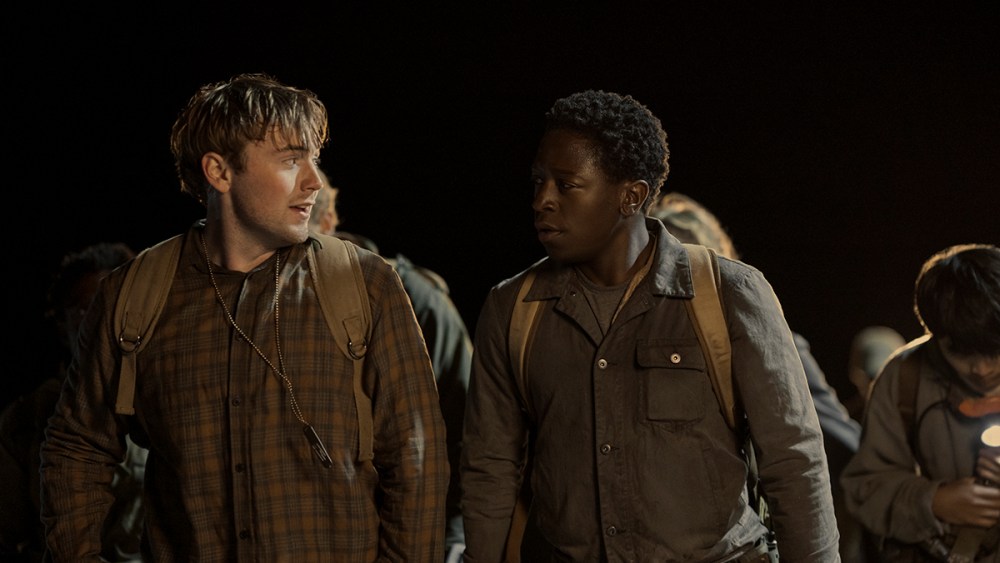Although it doesn’t reach the melodramatic highs for which it aims, director Francis Lawrence‘s “The Long Walk” is nonetheless a tense and surprising dystopian drama, steeped in personal and national ethos. Set in an alternate United States resembling the post-Vietnam era — the book by Stephen King, written under the pseudonym Richard Bachman, was published in 1979 — the film follows several dozen young men drafted by lottery into a seemingly never-ending walk, televised both for its jingoistic potential, and its brutal eliminations by armed soldiers. The goal is to keep walking until only one man remains, earning them a wish and countless riches: a premise bordering on fable-like, though its focused metaphors bring it within inches of reality.
The film verges on a gory, horrific thriller at times, but begins with the intimate drama of twenty-something Ray Garraty (Cooper Hoffman) bidding farewell to his distraught mother Ginnie (Judy Greer) as she drops him off at the starting line, for the 19th annual iteration of the deadly event. This militarized zone in the middle of nowhere plays host to 49 young men from all over the country — one from each state. Perhaps Alaska or Hawaii were never granted statehood in this alternate reality, but this, like many details of the wider setting, is left vague in JT Mollner’s screenplay. However, flaws of world-building tend to take a back seat when characters arrive so well-rounded and fully-formed, thanks in no small part to the actors playing them.
Before the walk begins, Garraty meets the kind and headstrong Peter McVries (David Jonsson), the lively, religious Arthur Baker (Tut Nyuot), the scrappy yapper Hank Olson (Ben Wang), and a litany of others along a nerd-to-jock spectrum — broad types who would feel at home in a typical American war film. The participants are even handed dog tags to mark their numbers before they begin the sleepless challenge, so that if they fall below the three-mile-an-hour speed limit, a soldier can hand them a warning over a megaphone. Go too slow, stop for too long, or stray off the path, and you run the risk of a bullet to the head. Flanked by tanks, and guided by a ruthless, nameless Major (Mark Hamill), the boisterous group begins their long journey to nowhere, with the aim of being the last man standing. Real and tangible friendships form in the meantime, but each one feels doomed — especially the central pairing of Garraty and McVries.
To make a film with largely one type of action — walking, with the occasional gunshot in front of straggling spectators — presents a unique challenge, but Lawrence and cinematographer Jo Willems meet it with aplomb. Rare are the moments in which “The Long Walk” feels repetitive, even though nearly every shot tracks backwards, capturing the damned participants head-on amidst a gloomy atmosphere. This is owed, in large part, to the film’s focus on its characters. It’s not the kind of work where you can depend on traditional over-the-shoulder coverage, but each instance of framing, and each bit of character blocking (whether laterally, or between background and foreground) feels uniquely conceived, with only the occasional cutaway to group shots for added emphasis — and to keep track of how many have died.
The violence is both explicit and inevitable, and is always framed by realistically distraught reactions, as the characters further discuss their doomed scenario. While technically voluntary, the Walk is just one facet of a totalitarian state trying to appease its economically downtrodden populace. And while we rarely, if ever, glimpse this outside world — it’s a far cry from Lawrence’s four reality-TV-inspired “Hunger Games” films — the young men’s relationship to that world, and their place within it, informs their respective outlooks, and thus, their dynamics with each other.
Some of the men are more troubled, and have anti-authoritarian streaks. Others are simply desperate for cash. And some, like McVries and Garraty, have more mysterious and esoteric motives, the gradual unspooling of which — over several exhausted days and nights — helps shape the movie’s mood of rebellion backed into a corner. “The Long Walk” is as much a film of hopeless young men born into a world of state violence as it is a parable for how fascism shapes people, their outlooks and their actions. This debate is multi-pronged, but comes to a head via the philosophical clash between its two leading, blossoming besties, whose mutual admiration is both invigorating and melancholy.
As Garraty, Hoffman conceals an animalistic determination beneath his personable façade — a drive to do something, or change something, that often leaves him blinkered. However, the film’s emotional highlight is Jonsson’s alluring conception of McVries, a charismatic, scar-faced leader for whom compassion is a guiding light, but one that doesn’t come easily. Jonsson is blessed with the kind of versatile expressiveness one might associate with ‘90s Jim Carrey, but rather than rubber-faced comedy, his talents are aimed squarely at broad Hollywood sentimentality (as was the case with his android role in “Alien: Romulus”). Together, Hoffman and Jonsson lead a physically and emotionally diverse ensemble, and guide the film towards its beating heart, via questions of how best to approach the world when everything feels hopeless.
“The Long Walk” never quite digs deep into the cruelty and anguish it often hints at — especially in its closing moments, which make big emotional swings. These require a much tighter thematic focus to land, but they leave too much to the imagination. But despite feeling open-ended (in a completely different manner from King’s source material), the film remains intriguing, if not outright riveting, for the vast majority of its runtime.

